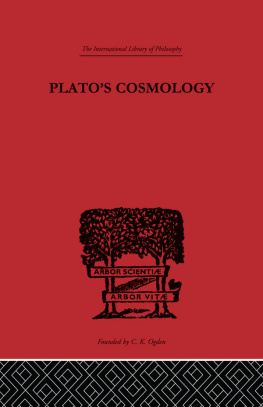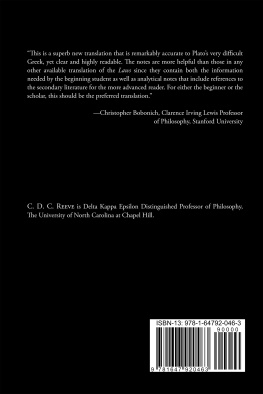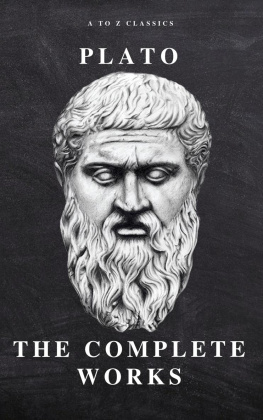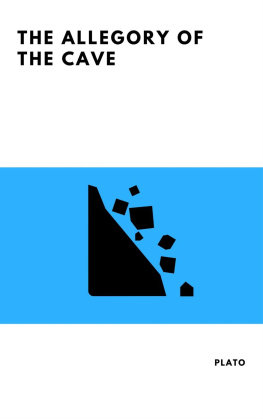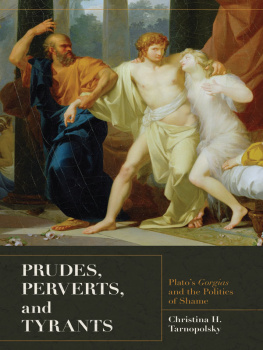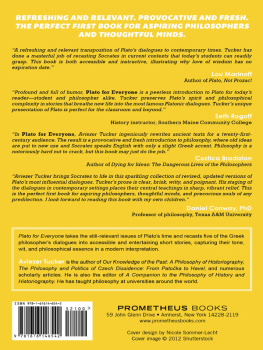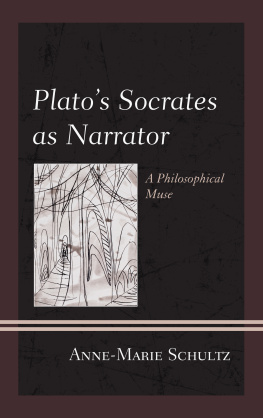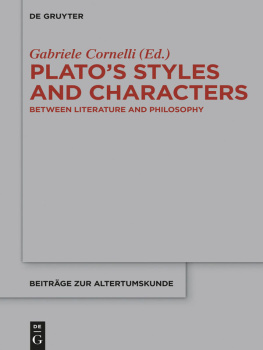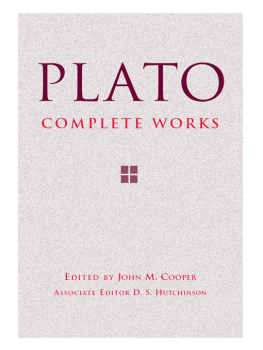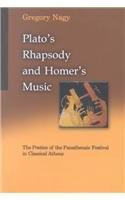Plato - Platos Cosmology: The Timaeus of Plato
Here you can read online Plato - Platos Cosmology: The Timaeus of Plato full text of the book (entire story) in english for free. Download pdf and epub, get meaning, cover and reviews about this ebook. year: 2014, publisher: Taylor and Francis, genre: Science. Description of the work, (preface) as well as reviews are available. Best literature library LitArk.com created for fans of good reading and offers a wide selection of genres:
Romance novel
Science fiction
Adventure
Detective
Science
History
Home and family
Prose
Art
Politics
Computer
Non-fiction
Religion
Business
Children
Humor
Choose a favorite category and find really read worthwhile books. Enjoy immersion in the world of imagination, feel the emotions of the characters or learn something new for yourself, make an fascinating discovery.
- Book:Platos Cosmology: The Timaeus of Plato
- Author:
- Publisher:Taylor and Francis
- Genre:
- Year:2014
- Rating:5 / 5
- Favourites:Add to favourites
- Your mark:
- 100
- 1
- 2
- 3
- 4
- 5
Platos Cosmology: The Timaeus of Plato: summary, description and annotation
We offer to read an annotation, description, summary or preface (depends on what the author of the book "Platos Cosmology: The Timaeus of Plato" wrote himself). If you haven't found the necessary information about the book — write in the comments, we will try to find it.
Plato: author's other books
Who wrote Platos Cosmology: The Timaeus of Plato? Find out the surname, the name of the author of the book and a list of all author's works by series.
Platos Cosmology: The Timaeus of Plato — read online for free the complete book (whole text) full work
Below is the text of the book, divided by pages. System saving the place of the last page read, allows you to conveniently read the book "Platos Cosmology: The Timaeus of Plato" online for free, without having to search again every time where you left off. Put a bookmark, and you can go to the page where you finished reading at any time.
Font size:
Interval:
Bookmark:

The International Library of Philosophy

Founded by C. K. Ogden
The International Library of Philosophy
In 10 Volumes
| I | Aristotles Theory of Contrariety | Anton |
| II | Platos Phaedo | Bluck |
| III | Plato and Parmenides | Cornford |
| IV | Platos Cosmology | Cornford |
| V | Platos Theory of Knowledge | Cornford |
| VI | The Philosophy of Plato | Lodge |
| VII | Platos Theory of Art | Lodge |
| VIII | Platos Theory of Education | Lodge |
| IX | Platos Theory of Ethics | Lodge |
| X | Outlines of the History of Greek Philosophy | Zeller |
PLATOS COSMOLOGY
The Timaeus of Plato
translated with a Running
Commentary
by
FRANCIS MACDONALD CORNFORD

First published 1937 by Routledge and Kegan Paul Ltd
Published 2014 by Routledge
2 Park Square, Milton Park, Abingdon, Oxon OX14 4RN
711 Third Avenue, New York, NY 10017, USA
Routledge is an imprint of the Taylor & Francis Group, an informa business
1937 Francis MacDonald Cornford
All rights reserved. No part of this book may be reprinted or reproduced or utilized in any form or by any electronic, mechanical, or other means, now known or hereafter invented, including photocopying and recording, or in any information storage or retrieval system, without permission in writing from the publishers.
The publishers have made every effort to contact authors/copyright holders of the works reprinted in the International Library of Philosophy.
This has not been possible in every case, however, and we would welcome correspondence from those individuals/companies we have been unable to trace.
These reprints are taken from original copies of each book. In many cases the condition of these originals is not perfect. The publisher has gone to great lengths to ensure the quality of these reprints, but wishes to point out that certain characteristics of the original copies will, of necessity, be apparent in reprints thereof.
British Library Cataloguing in Publication Data
A CIP catalogue record for this book
is available from the British Library
Platos Cosmology
ISBN: 978-0-415-22518-2 (hbk)
Ancient Philosophy: 10 Volumes
ISBN 0-415-22571-X
The International Library of Philosophy: 56 Volumes
ISBN 0-415-21803-9

ARMILLARY SPHERE
The globe at the centre, representing the Earth, is inscribed: Globe Terrestre. A Paris, chez Delamarche Gog; rue du Foin Jacques au Collge de Me Gervais
[frontispiece
TO
ELEANOR MEREDITH COBHAM

THIS book is constructed on the same plan as an earlier volume in the series, Platos Theory of Knowledge, It contains a translation of the Timaeus interspersed with a commentary discussing each problem of interpretationand there are many hitherto unsolvedas it arises. My first aim has been to render Platos words as closely as I can. Anyone who attempts to reproduce his exalted poetical style must face the certainty of failure, with the added risk of falsifying the sense, especially by misleading reminiscences of the English Bible. The commentary is designed to guide the reader through a long and intricate argument and to explain what must remain obscure in the most faithful translation; for the Timaeus covers an immense field at the cost of compressing the thought into the smallest space. Only with some such aid can students of theology and philosophy have access to a document which has deeply influenced mediaeval and modern speculation. I have tried not to confuse the interpretation of the text with the construction of theories of wider scope. The later Platonism is a subject on which agreement may never be reached; but there is some hope of persuading scholars that a Greek sentence means one thing rather than another.
The translation follows Burnets text, except where I have given reasons for departing from it or proposed corrections of passages that are probably or certainly corrupt. For the interpretation I have consulted, in the first instance, the commentaries of Proclus and Chalcidius, the fragment of Galens commentary lately re-edited by Schroder, the relevant treatises of Plutarch, and Theon of Smyrna, who preserves valuable extracts from Dercylides and Adrastus. The careful summary of the Timaeus in the Didascalicus of the Middle Platonist Albinus deserves more attention than it receives. Among the moderns I have drawn freely upon Martins admirable tudes sur le Time de Platon, Archer-Hinds commentary, and the translations of Apelt, Fraccaroli, Rivaud, and Professor A. E. Taylor.
More useful than any of these has been Professor Taylors Commentary, His wide learning and untiring industry have amassed a great quantity of illustrative material, and he has cleared up the meaning of many sentences hitherto misunderstood. These amendments will pass into the common stock of future editors and translators, and I have for the most part adopted them tacitly. It is unfortunate that. I should so often have had to quote his views where it was necessary to give reasons for dissent. My notes, accordingly, do not indicate the extent of a debt which I here acknowledge with gratitude.
On many of the larger questions of interpretation, however, I differ widely from Professor Taylor. He has launched in this volume a new Taylorian heresy. After confounding the persons of Socrates and Plato in earlier books, he has now divided the substance of Plato and Timaeus. All the ancient Platonists from Aristotle to Simplicius and all mediaeval and modern scholars to our own day have assumed that this dialogue contains the mature doctrine of its author. Professor Taylor holds that they have been mistaken. He writes:
It is in fact the main thesis of the present interpretation that the teaching of Timaeus can be shown to be in detail exactly what we should expect in a fifth-century Italian Pythagorean who was also a medical man, that it is, in fact, a deliberate attempt to amalgamate Pythagorean religion and mathematics with Empedoclean biology, and thus correctly represents the same tendency in fifth-century thought for which the name, e.g. of Philolaus stands in the history of philosophy. If this view is sound, it follows that it is a mistake to look in the Timaeus for any revelation of the distinctively Platonic doctrines, the  as Aristotle calls them (Met. A. 987a, 31), by which Platonism is discriminated from Pythagoreanism, or for a later Platonic theory which can be set in opposition to the type of doctrine expounded in the
as Aristotle calls them (Met. A. 987a, 31), by which Platonism is discriminated from Pythagoreanism, or for a later Platonic theory which can be set in opposition to the type of doctrine expounded in the
Font size:
Interval:
Bookmark:
Similar books «Platos Cosmology: The Timaeus of Plato»
Look at similar books to Platos Cosmology: The Timaeus of Plato. We have selected literature similar in name and meaning in the hope of providing readers with more options to find new, interesting, not yet read works.
Discussion, reviews of the book Platos Cosmology: The Timaeus of Plato and just readers' own opinions. Leave your comments, write what you think about the work, its meaning or the main characters. Specify what exactly you liked and what you didn't like, and why you think so.

